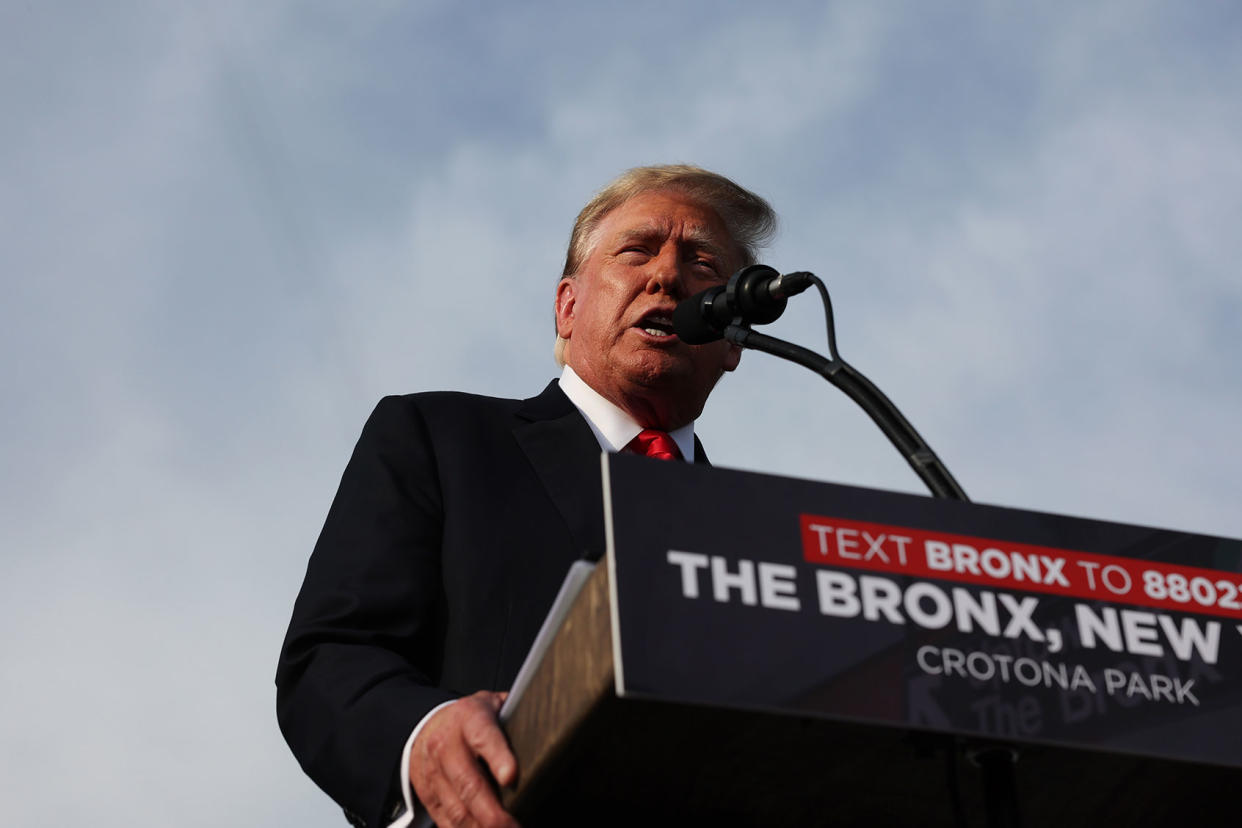“Cash for policy changes": Dems say oil donors funnel millions into Trump legal fee "slush fund"

- Oops!Something went wrong.Please try again later.
To be clear, nobody is persecuting the American oil industry. In 2023, the United States produced more barrels of crude oil than any other country on the globe, for the sixth year in a row, and exported more of them than any country has ever done before – almost a million barrels more, each day, than in the last year of Donald Trump’s presidency. But America’s wealthy elites are feeling persecuted these days: by President Joe Biden; by DEI or CRT or whatever we’re using as a stand-in for “diversity”; by the existence of trans people; by the acknowledgment that climate change exists. And when America’s wealthy elites get deep in their feelings, they open up their pocketbooks and ask the forces of reaction to take their damn money.
In a single day, Bloomberg reports, “oil executives and other deep-pocketed donors” threw some $40 million at the Trump campaign, driven by the former president’s pledge to “drill, baby, drill.” Dan Eberhart, a repeat Trump donor and CEO of Canary Drilling Services, explained that he and others in the industry “fear that the current regulatory approach in Washington amounts to death by a thousand cuts for oil and gas companies,” according to Bloomberg. Trump, by contrast, “repeatedly stressed that he stands for what’s good for America, and that we need energy to thrive and keep the economy growing,” in Eberhart’s telling (solar accounted for more than half of all new electricity added to the grid last year, but green energy doesn’t count).
The haul for Trump, who by this time next month could be a convicted felon, came after another meeting with America’s oil-and-gas elites where he promised to do the industry’s bidding – for the relatively low price of $1 billion. As The Washington Post reported, Trump, addressing the executives at his Mar-a-Lago resort, said that the 10-figure donation would be a “deal” given his pledge to undo the Biden administration’s environmental regulations, from restrictions on power plant carbon emissions to incentives for electric vehicles.
Senate Democrats are calling that a “quid pro quo.”
“Time and time again, both Mr. Trump and the U.S. oil and gas industry have proved they are willing to sell out Americans to pad their own pockets,” Senate Finance Committee Chairman Ron Wyden, D-Ore., and Senate Budget Committee Chairman Sheldon Whitehouse, wrote in a letter Thursday sent to a host of pro-Trump fossil-fuel executives. They accuse the industry of helping Trump funnel campaign donations into “a slush fund to pay his legal fees,” and of being willing partners in an exchange of “campaign cash for policy changes.”
There are, from a major polluter’s perspective, legitimate grievances with the Biden administration. While there has been no war on energy, with carbon-neutral solar and wind deployments thanks in part to the Inflation Reduction Act, the White House has restricted oil and gas leasing on some federal lands and set a target of reducing carbon emissions to zero by 2050. (Trump, in his first term, did not set any goal for cutting emissions, instead electing to pull out of the Paris Agreement.)
For energy companies that have no desire to diversify away from fossil fuels, Trump is indeed a safer bet than the status quo, according to Kathy Mulvey, climate accountability director at the Union of Concerned Scientists. Trump could unilaterally undo much of Biden’s climate agenda, in part through executive orders the oil and gas industry has already drafted for him.
“Although there have been really important advances under the Biden administration, the oil and gas industry is still aggressively expanding its exploration and production at a time when the world needs to phase out fossil fuels,” Mulvey told Salon. In 2022, the industry profited from the spike in prices wrought by Russia’s invasion of Ukraine; it continues to rake in cash, with Exxon Mobil and Chevron, the two largest U.S. energy companies, each reporting more than $30 billion in profits last year.
Still, while the Biden administration is not proposing an overnight transition to green energy – many environmentalists would charge that it’s not being aggressive enough to stave off the worst impacts of a warming climate – it is, in its actions, reflecting the global and scientific consensus that carbon emissions must be reined in.
“Does a corporation that’s determined to stick with business as usual in fossil fuels see the writing on the wall, with actions that are being taken or could be taken? Yeah, they should see that,” Mulvey said.
Instead of transitioning to all the money that can be made in clean energy, though, some of the world’s leading contributors to climate change are banking on the return to power of an authoritarian who deems climate change a “hoax.” For the oil and gas industry, a democratic backslide is, like a warming planet, just another cost of doing business.

